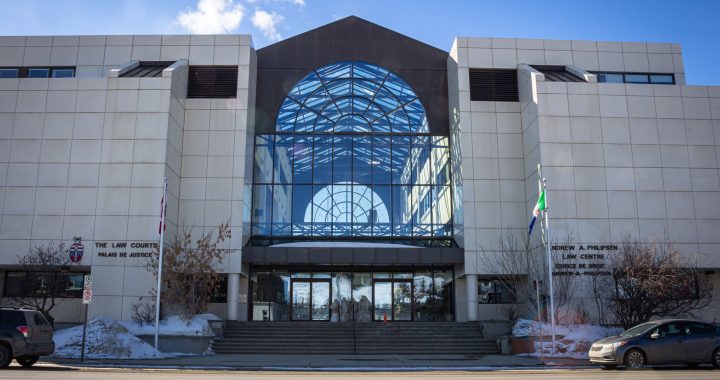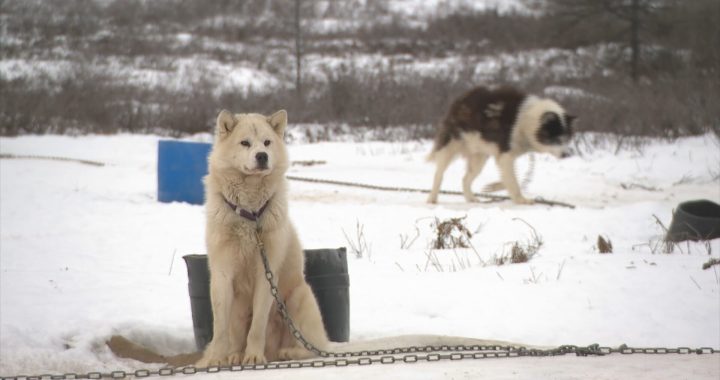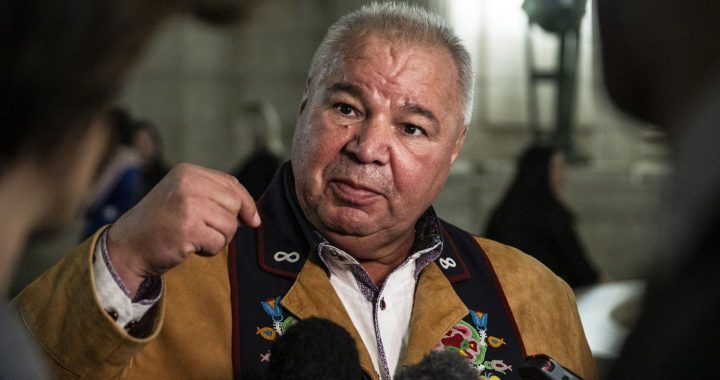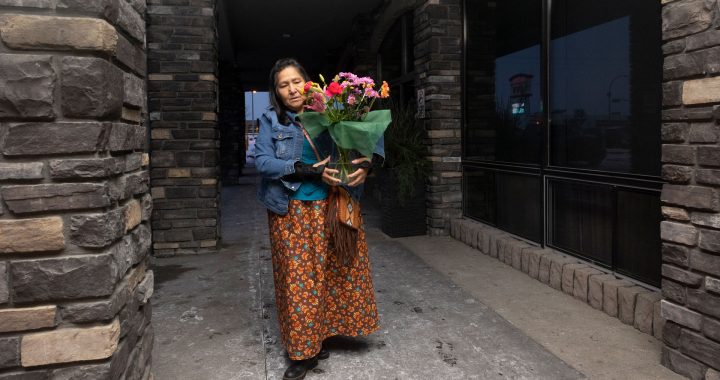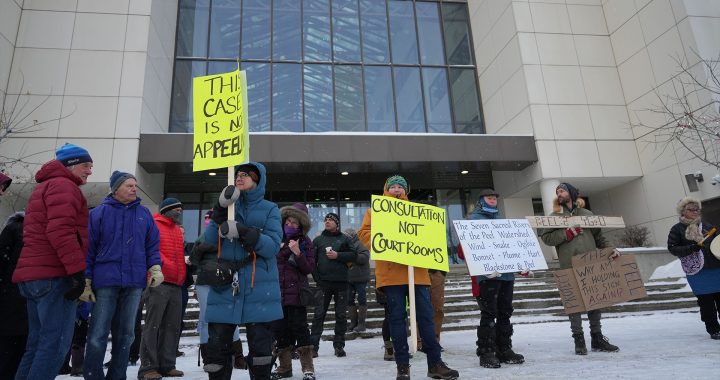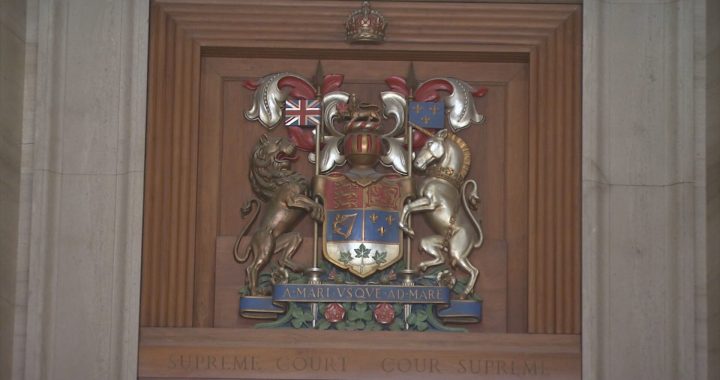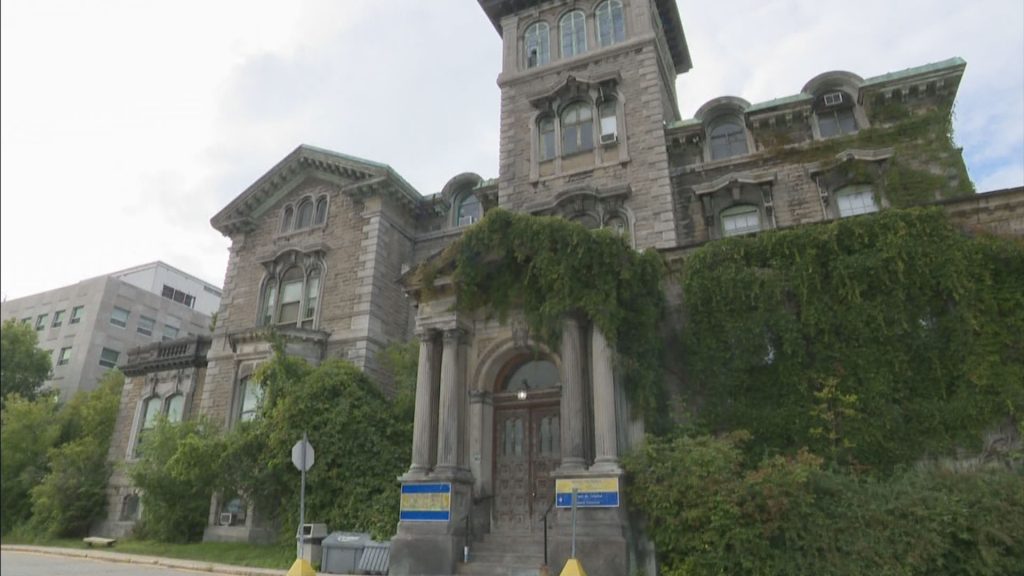
The old Royal Victoria Hospital in Montreal. Photo: APTN.
Cadaver dogs have detected potential human remains on McGill University grounds where a group called the Mohawk Mothers believe unmarked graves exist.
On June 9, 2023, three cadaver dog teams from the Ottawa Valley Search and Rescue Dog Association scoured the grounds under the supervision of archeologists, dog handlers and two Kanieke’haka cultural monitors.
All dogs signaled that they detected human remains in front of the Hersey Pavillion, which was the site of the old Royal Victoria Hospital’s nurses’ sleeping quarters.
“Given that three separate dog teams indicated the same location independently with a TFR, we are confident that the odour of human remains is in this area,” said the report.
This was part of the archeological procedures mandated in a settlement agreement reached in early April between McGill University, Quebec’s infrastructure society, the McGill University Health Centre (MUHC) and the Mohawk Mothers, or Kanistansera, six women from Kahnawake.
The Kanistensera allege that unmarked graves of victims of the MK-ULTRA mind control experiments from the 1950s and 1960s may be found on the grounds of the Royal Victoria Hospital and the old Allan Memorial institute, where McGill plans to build the New Vic project, a renovated facility.
Since the site was detected, archeological procedures have been halted and the parties involved in the agreement have returned to the negotiating table to determine how to handle these new developments.
McGill has been attempting to go forward with the New Vic project, which would revamp the old Royal Victoria site – which neighbours the AMI where CIA- and Canadian-funded psychiatric experiments took place from 1957 to 1964.
The Kahnistansera allege that there is a strong possibility that bodies of Indigenous children who they say were victims of botched psychiatric experiments are buried on the grounds of the Allan Memorial Institute (AMI), a former psychiatric hospital which is owned by McGill.
After a settlement agreement was reached in April, archeological works began to determine whether human remains were present on-site.
Kanistensera alleges insufficient onsite security
At the case management hearing June 29, the Kanistensera and the special interlocutor on unmarked graves’ legal representation, Julian Falconer, stated that the settlement agreement was not sufficient to address these new developments.
Section 17 of the agreement states that if a discovery is made, “McGill, SQI and the Kanien’keha:ka Kahnistensera will seek the advice of the Panel [of archeologists] as to how to move forward.”
McGill said it was following the mandates of the agreement.
“As required the work has been stopped, security is patrolling, and fences have been put up,” said Doug Mitchell, McGill’s legal representative.
Mitchell also stated they had filed a permit to begin archeological works to verify if human remains were present on the site of concern.
While McGill and SQI said they were following the procedures outlined in the agreement by following the advice of the panel of archeologists, Falconer said “the [archeology] panel expressly stated they don’t have expertise on security recommendations” to prevent the site from being disturbed.

Additionally, the Kanistensera said their cultural monitors have not seen the promised 24-hour surveillance of the site in question at McGill. One cultural monitor, Karonhia’nó:ron Dallas Binette of Kanesatake, said that during the archeological foot survey of the site of the old Royal Victoria Hospital in May, he and the archeologists noticed recently disturbed ground behind the Ross Pavillion.
“There were artifacts that were disturbed, mainly related to a dump behind the Ross Pavilion, but grounds being disturbed,” said Karonhia’nó:ron.
“There was evidence of non-authorized persons being able to freely walk around the Royal Victoria and Allan Memorial site,” he said.
Karonhia’nó:ron said that on June 9, “while the [cadaver] dogs were working, pedestrians were able to encroach on their space. This didn’t affect the work of the dogs, but just in terms of respecting the site archeologically. More needs to be done to protect the integrity of the land and people’s spirits.”
The Kanistensera contested McGill’s claims that there has been sufficient security increased after the findings of the sniffer dogs.
Cooperation ‘not what it could be’ says archives firm

There are also concerns over the speed of handing over archival records. In the settlement agreement, the MUHC, McGill, and the Library and Archives Canada are supposed to expedite access to relevant archival records on those who may have attended the Allan Memorial Institute and been subject to the MK-ULTRA experiments to Know History, an independent history firm.
However, the panel has only been contracted for six months to advise on archeological works on the proposed New Vic site.
“If you don’t have access to the records in a timely way, then conclusions are tainted by that. You’re operating essentially in the blind. And so this accelerated timeline has meant the need for accelerated access to records and that’s not happening,” said Falconer in a post-hearing interview with APTN News.
While MUHC, McGill and Library and Archives Canada stated they were in the process of handing over records, Falconer said he had received communication from Know History that cooperation was “not what it could be.”
“What the defendants described in the case management meeting was their interpretation of how things are progressing,” said Falconer. “What I can tell you is we are getting reports directly back from Know History that simply don’t support that, as we indicated in court.”
Judge Gregory Moore gave the Kanistensera three options: to expand the panel to include expertise in site security; to revisit the mediation process between the defendants and plaintiffs and possibly modify the settlement agreement; or to begin a litigation process against the defendants.
The Kanistensera have until July 14 to decide how to proceed.




